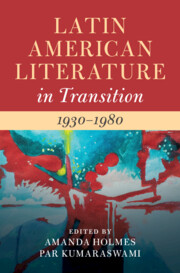Book contents
- Latin American Literature in Transition 1930–1980
- Latin American Literature in Transition
- Latin American Literature in Transition 1930–1980
- Copyright page
- Contents
- Contributors
- Introduction
- Part I War, Revolution, Dictatorship
- Chapter 1 Revolutions and Literary Transitions
- Chapter 2 Jorge Luis Borges
- Chapter 3 Anti-Fascism and Literature in Brazil
- Chapter 4 Disaster Innovation in the Mid-century Spanish American Novel
- Chapter 5 Struggle at the Margins
- Part II Metropolis and Ruins
- Part III Solidarity
- Part IV Aesthetics and Innovation
- Index
- References
Chapter 3 - Anti-Fascism and Literature in Brazil
The Many Wars of Antônio Callado
from Part I - War, Revolution, Dictatorship
Published online by Cambridge University Press: 24 January 2023
- Latin American Literature in Transition 1930–1980
- Latin American Literature in Transition
- Latin American Literature in Transition 1930–1980
- Copyright page
- Contents
- Contributors
- Introduction
- Part I War, Revolution, Dictatorship
- Chapter 1 Revolutions and Literary Transitions
- Chapter 2 Jorge Luis Borges
- Chapter 3 Anti-Fascism and Literature in Brazil
- Chapter 4 Disaster Innovation in the Mid-century Spanish American Novel
- Chapter 5 Struggle at the Margins
- Part II Metropolis and Ruins
- Part III Solidarity
- Part IV Aesthetics and Innovation
- Index
- References
Summary
Brazilian novelist, playwright, and journalist Antônio Callado (1917-97) became, in the second half of the twentieth century, synonymous with cultural resistance against the Brazilian military dictatorship (1964-85). Documents and scripts found in 2014 at the BBC Written Archives unveil Callado’s experience as a writer working for the BBC Latin American Service in Britain, broadcasting anti-fascist propaganda in Portuguese to Brazilian audiences during World War II. In Brazil, Getúlio Vargas’ dictatorial regime Estado Novo (1937-45) was still emerging from internal clashes between pro-fascist and pro-Allies political factions, which preceded Brazil’s entry into the conflict in August 1942. In Britain between 1941 and 1947, Callado was able to engage with cosmopolitan intellectual networks and to explore literary influences that were not part of the aesthetic and political vocabulary of Brazilian modernists in the 1920s and 1930s. Callado’s socialist turn – which resulted in his political arrests in the 1960s and 1970s – was considerably influenced by his formative war-years. His experiences during World War II also deeply informed the political aspects of his writing, which denounced and derided Brazilian authoritarianism.
Keywords
- Type
- Chapter
- Information
- Latin American Literature in Transition 1930–1980 , pp. 46 - 64Publisher: Cambridge University PressPrint publication year: 2022



